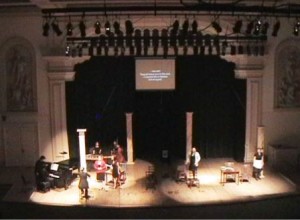Guest Blogger: Oscar Bettison
Composer Oscar Bettison sent along this report about student opera performances in Baltimore, Maryland.
Opera Etudes at Peabody

Every other year at Peabody, the month of May means one thing for the composition and opera departments: ‘Opera Etudes.’ This project, which has been running for twenty-five years under the guidance of the Director of Opera Programs Roger Brunyate, is a year-long collaboration between graduate composition students and the opera department. Starting in the fall, composers are paired with librettists and singers to work on the creation of short staged opera scenes. These are then fully staged in Friedberg Hall, the main concert hall at Peabody, as one of the final events of the academic year. Occasionally, time pressures take their toll and some collaborations fall apart before making it to the final stage, but this year all seven projects made it from inception to the stage at Friedberg. As could be expected they were a varied bunch, running the gamut from retelling of fairytales (Jake Runestad) to tense family drama (Emily Koh), from comic opera (Josh Bornstein, Jon Carter, Zhangyi Chen) to darker subjects involving infidelity and murder (Jeff Zeiders, Daniel Gil-Marca).
The purpose of this project is to teach composers how to work with others and to provide them with the tools to create healthy collaborations. So often composers get caught up in the nitty-gritty of pitches and rhythm, failing to see the ramifications of the decisions they make in the real world of performance. The Etudes project is set to address this and to perhaps set in motion new opera collaborations in the future. All of the composers seemed to gain a great deal of experience from the process. In the first place, how often do student composers get to have other musicians spend a year learning and memorizing their work? More fundamentally, in working with all these different elements – librettists, singers and directors – composers start to see how to think in different dimensions as well as how to collaborate; both of which should stand them in good stead for the future.
The commitment from the opera department is crucial. These are always fully committed performances. The singers have, of course memorized the music, but they approach this project in the same way as they would any opera in the repertory and this is fundamentally what is so satisfying about the exercise. Finally, the environment in which the scenes are presented – a packed house in the main concert hall – really makes this feel like an event. I know from personal observation that many music schools round out the year with a big production: but how many do this featuring the music of their own students?
Ultimately all of this bodes well for the future. In years past some of the most successful projects have lead to bigger operas, again put on by the opera department. I wonder how many of this year’s works will lead to new opera productions both at Peabody and elsewhere?
Composer Oscar Bettison teaches at the Peabody Institute of Johns Hopkins University. His music is published by Boosey and Hawkes.
My grandfather was Oscar Bettison, who was born in Hull, Yorkshire in about 1892. His father was a grain and seed merchant. Oscar joined the British Army at the age of 16, where he learned to play the bugle so well that he won many badges for his playing. He was always nicknamed “Badgie”. Years later, when King George V died, he was flown back to England from where he was living in South Africa specifically to play the “last post” at the King’s funeral. He was considered the best bugler in the Empire at the time!Oscar was also very clever with mathematics, but ended up using his calculator-mind by become one of the chief auditors for South African railways. Would you have any connection to his family?